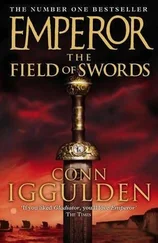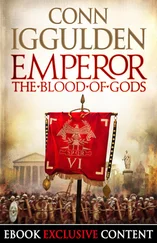"We'll have to find somewhere to hide him," he said. "Your mother doesn't like us catching animals. You remember when she found out about the fox?"
Gaius winced, looking at the ground. "There's an empty chicken coop next to the stables. We could put him in there. What do ravens eat?"
"Meat, I think. They scavenge battlefields, unless that's crows. We can get a few scraps from the kitchens and see what he takes, anyway. That won't be a problem."
"We'll have to tie twine to his legs for the training, otherwise he'll fly off," Gaius said thoughtfully.
Tubruk was talking to three carpenters who were to repair part of the estate roof. He spotted the boys as they walked into the estate yard, and motioned them over to him. They looked at each other, wondering if they could run, but Tubruk wouldn't let them get more than a few paces, for all his apparent inattention as he turned back to the workers.
"I'm not giving Zeus up," Marcus whispered harshly.
Gaius could only nod as they approached the group of men.
"I'll come along in a few minutes," Tubruk instructed as the men walked to their tasks. "Take the tiles off the section until I get there."
He turned to the boys. "What's this? A raven? Must be a sick one if you caught it."
"We trapped him in the woods. Followed him and brought him down," Marcus said, his voice defiant.
Tubruk smiled as if he understood, and reached out to stroke the bird's long beak. Its energy seemed to have gone and it panted almost like a dog, revealing a slender tongue between the hard blades.
"Poor thing," Tubruk muttered. "Looks terrified. What are you going to do with him?"
"His name's Zeus. We're going to train him as a pet, like a hawk."
Tubruk shook his head once, slowly. "You can't train a wild bird, boys. A hawk is raised from a chick by an expert, and even they stay wild. The best trainer can lose one every now and then if it flies too far from him. Zeus is fully grown. If you keep him, he'll die."
"We can use one of the old chicken coops," Gaius insisted. "There's nothing in there now. We'll feed him and fly him on a string."
Tubruk snorted. "Do you know what a wild bird does if you keep him locked up? He can't stand walls around him. Especially a tiny space like one of the chicken coops. It will break his spirit and, day by day, he will pull his own feathers out in misery. He won't eat, he'll just hurt himself until he dies. Zeus here will choose death over captivity. The kindest thing you can do for him is to let him go. I don't think you could have caught him unless he was sick, so he might be dying anyway, but at least let him spend his last days in the woods and the air, where he belongs."
"But…" Marcus fell silent, looking at the raven.
"Come on," Tubruk said. "Let's go out into the fields and watch him fly."
Glumly, the boys looked at each other and followed him back out of the gates. Together, they stood gazing down the hill.
"Set him free, boy," Tubruk said, and something in his voice made them both look at him.
Marcus raised and opened his hands, and Zeus heaved himself into the air, spreading large black wings and fighting for height. He screamed frustration at them until he was just a dot in the sky over the woods. Then they saw him descend and disappear.
Tubruk reached out and held the necks of the two boys in his rough hands.
"A noble act. Now there are a number of chores to do, and I couldn't find you earlier, so they've piled up waiting for your attention. Inside."
He steered the boys through the gate into the courtyard, taking a last look over the fields toward the woods before he followed them.
That summer saw the start of the boys' formal education. From the beginning, they were both treated equally, with Marcus also receiving the training necessary to run a complex estate, albeit a minor one. In addition to continuing the formal Latin that had been drummed into them since birth, they were taught about famous battles and tactics as well as how to manage men and handle money and debts. When Suetonius left to be an officer in an African legion the following year, both Gaius and Marcus had begun to learn Greek rhetoric and the skills of debate that they would need if, as young senators later on, they ever chose to prosecute or defend a citizen on a matter of law.
Although the three hundred members of the Senate met only twice each lunar month, Gaius's father, Julius, remained in Rome for longer and longer periods as the Republic struggled to deal with new colonies and its swiftly growing wealth and power. For months, the only adults Gaius and Marcus would see were Aurelia and the tutors, who arrived at the main house at dawn and left with the sun sinking behind them and denarii jingling in their pockets. Tubruk was always there too, a friendly presence who stood no nonsense from the boys. Before Suetonius had left, the old gladiator had walked the five miles to the main house of the neighboring estate and waited eleven hours, from dawn to dusk, to be admitted to see the eldest son of the house. He didn't tell Gaius what had transpired, but had returned with a smile and ruffled Gaius's hair with his big hand before going down to the stables to see to the new mares as they came into season.
Of all the tutors, Gaius and Marcus enjoyed the hours with Vepax the best. He was a young Greek, tall and thin in his toga. He always arrived at the estate on foot and carefully counted the coins he earned before walking back to the city. They met with him for two hours each week in a small room Gaius's father had set aside for the lessons. It was a bare place, with a stone-flagged floor and unadorned walls. With the other tutors, droning through the verses of Homer and Latin grammar, the two boys often fidgeted on the wooden benches, or drifted in concentration until the tutor noticed and brought them back with sharp smacks from the cane. Most were strict and it was difficult to get away with much with only the two of them to take up the master's attention. One time, Marcus had used his stylus to draw a picture of a pig with a tutor's beard and face. He had been caught trying to show it to Gaius and had to hold out his hand for the stick, suffering miserably through three sharp blows.
Vepax didn't carry a cane. All he ever had with him was a heavy cloth bag full of clay tablets and figures, some blue and some red to show different sides. By the appointed hour, he would have cleared the benches to one side of the room and set out his figures to represent some famous battle of the past. After a year of this, their first task was to recognize the structure and name the generals involved. They knew Vepax would not limit himself to Roman battles; sometimes the tiny horses and legionary figures represented Parthia or ancient Greece or Carthage. Knowing Vepax was Greek himself, the boys had pushed the young man to show them the battles of Alexander, thrilled by the legends and what he had achieved at such a young age. At first, Vepax had been reluctant, not wanting to be seen to favor his own history, but he had allowed himself to be persuaded and showed them every major battle where records and maps survived. For the Greek wars, Vepax never opened a book, placing and moving each piece from memory.
He told the boys the names of the generals and the key players in each conflict as well as the history and politics when they had a direct bearing on the day. He made the little clay pieces come alive for Marcus and Gaius, and every time it came to the end of the two hours, they would look longingly at them as he packed them away in his bags, slowly and carefully.
One day, as they arrived, they found most of the little room covered in the clay characters. A huge battle had been set out and Gaius counted the blue characters quickly, then the red, multiplying it in his head as he had been taught by the arithmetic tutor.
Читать дальше
Конец ознакомительного отрывка
Купить книгу












